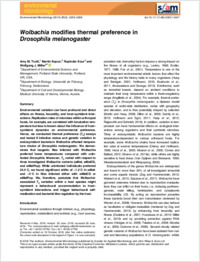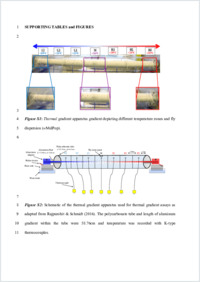Wolbachia modifies thermal preference in Drosophila melanogaster
- Truitt, Amy M. Department of Environmental Science and ManagementPortland State University Portland OR USA
- Kapun, Martin Department of BiologyUniversité de Fribourg Fribourg Switzerland
- Kaur, Rupinder Department of Cell and Developmental BiologyMedical University of Vienna Vienna Austria
- Miller, Wolfgang J. Department of Cell and Developmental BiologyMedical University of Vienna Vienna Austria
-
03.07.2018
Published in:
- Environmental Microbiology. - 2019, vol. 21, no. 9, p. 3259–3268
English
Environmental variation can have profound and direct effects on fitness, fecundity, and host–symbiont interactions. Replication rates of microbes within arthropod hosts, for example, are correlated with incubation temperature but less is known about the influence of host–symbiont dynamics on environmental preference. Hence, we conducted thermal preference (Tp) assays and tested if infection status and genetic variation in endosymbiont bacterium Wolbachia affected temperature choice of Drosophila melanogaster. We demonstrate that isogenic flies infected with Wolbachia preferred lower temperatures compared with uninfected Drosophila. Moreover, Tp varied with respect to three investigated Wolbachia variants (wMel, wMelCS, and wMelPop). While uninfected individuals preferred 24.4°C, we found significant shifts of −1.2°C in wMel‐ and −4°C in flies infected either with wMelCS or wMelPop. We, therefore, postulate that Wolbachia‐associated Tp variation within a host species might represent a behavioural accommodation to host–symbiont interactions and trigger behavioural self‐medication and bacterial titre regulation by the host.
- Faculty
- Faculté des sciences et de médecine
- Department
- Département de Biologie
- Language
-
- English
- Classification
- Biological sciences
- License
- License undefined
- Identifiers
-
- RERO DOC 327369
- DOI 10.1111/1462-2920.14347
- Persistent URL
- https://folia.unifr.ch/unifr/documents/308037
Other files
Statistics
Document views: 55
File downloads:
- kap_wmt.pdf: 112
- kap_wmt_sm.pdf: 81

